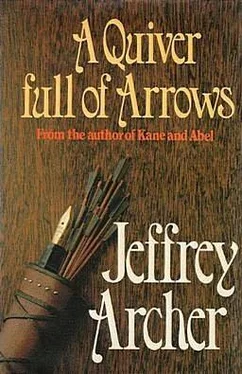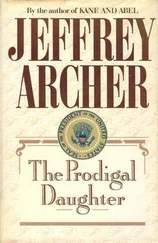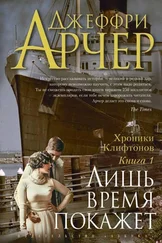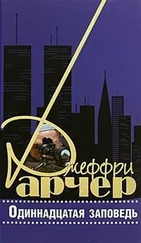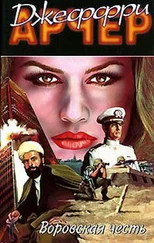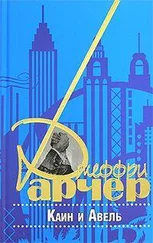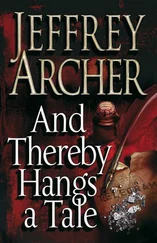“Don’t be absurd. When you win the prize, they’ll pronounce you the star pupil of the decade. After all, you will have had to beat me to achieve the distinction.”
She tried to laugh. “Of course I wanted to beat you, William, but only for my father.”
“How did he die?”
“Cancer, only he never let me know. He asked me not to go home before the summer term, as he felt the break might interfere with my finals and the Charles Oldham. While all the time he must have been keeping me away because he knew if I saw the state he was in that would have been the end of my completing any serious work.”
“Where do you live?” asked William, again surprised that he did not know.
“Brockenhurst. In Hampshire. I’m going back there tomorrow morning. The funeral’s on Wednesday.”
“May I take you?” asked William.
Philippa looked up and was aware of a softness in her adversary’s eyes that she had not seen before. “That would be kind, William.”
“Come on then, you silly woman,” he said. “I’ll walk you back to your college.”
“Last time you called me ‘silly woman’ you meant it.”
William found it natural that they should hold hands as they walked along the river bank. Neither spoke until they reached Somerville.
“What time shall I pick you up?” he asked, not letting go of her hand.
“I didn’t know you had a car.”
“My father presented me with an old MG when I was awarded a first. I have been longing to find some excuse to show the damn thing off to you. It has a press button start, you know.”
“Obviously he didn’t want to risk waiting to give you the car on the Charles Oldham results.” William laughed more heartily than the little dig merited.
“Sorry,” she said. “Put it down to habit. I shall look forward to seeing if you drive as appallingly as you write, in which case the journey may never come to any conclusion. I’ll be ready for you at ten.”
On the journey down to Hampshire, Philippa talked about her father’s work as a parish priest and inquired after William’s family. They stopped for lunch at a pub in Winchester. Rabbit stew and mashed potatoes.
“The first meal we’ve had together,” said William.
No sardonic reply came flying back; Philippa simply smiled.
After lunch they traveled on to the village of Brockenhurst. William brought his car to an uncertain halt on the gravel outside the vicarage. An elderly maid, dressed in black, answered the door, surprised to see Miss Philippa with a man. Philippa introduced Annie to William and asked her to make up the spare room.
“I’m so glad you’ve found yourself such a nice young man,” remarked Annie later. “Have you known him long?”
Philippa smiled. “No, we met for the first time yesterday.”
Philippa cooked William dinner, which they ate by a fire he had made up in the front room. Although hardly a word passed between them for three hours, neither was bored. Philippa began to notice the way William’s untidy fair hair fell over his forehead and thought how distinguished he would look in old age.
The next morning, she walked into the church on William’s arm and stood bravely through the funeral. When the service was over William took her back to the vicarage, crowded with the many friends the parson had made.
“You mustn’t think ill of us,” said Mr. Crump, the vicar’s warden, to Philippa. “You were everything to your father and we were all under strict instructions not to let you know about his illness in case it should interfere with the Charles Oldham. That is the name of the prize, isn’t it?”
“Yes,” said Philippa. “But that all seems so unimportant now.”
“She will win the prize in her father’s memory,” said William.
Philippa turned and looked at him, realizing for the first time that he actually wanted her to win the Charles Oldham.
They stayed that night at the vicarage and drove back to Oxford on Thursday. On Friday morning at ten o’clock William returned to Philippa’s college and asked the porter if he could speak to Miss Jameson.
“Would you be kind enough to wait in the Horsebox, sir,” said the porter as he showed William into a little room at the back of the lodge and then scurried off to find Miss Jameson. They returned together a few minutes later.
“What on earth are you doing here?”
“Come to take you to Stratford.”
“But I haven’t even had time to unpack the things I brought back from Brockenhurst.”
“Just do as you are told for once; I’ll give you fifteen minutes.”
“Of course,” she said. “Who am I to disobey the next winner of the Charles Oldham? I shall even allow you to come up to my room for one minute and help me unpack.”
The porter’s eyebrows nudged the edge of his cap but he remained silent, in deference to Miss Jameson’s recent bereavement. Again it surprised William to think that he had never been to Philippa’s room during their three years. He had climbed the walls of all the women’s colleges to be with a variety of girls of varying stupidity but never with Philippa. He sat down on the end of the bed.
“Not there, you thoughtless creature. The maid has only just made it. Men are all the same, you never sit in chairs.”
“I shall one day,” said William. “The chair of English Language and Literature.”
“Not as long as I’m at this University, you won’t,” she said, as she disappeared into the bathroom.
“Good intentions are one thing but talent is quite another,” he shouted at her retreating back, privately pleased that her competitive streak seemed to be returning.
Fifteen minutes later she came out of the bathroom in a yellow flowered dress with a neat white collar and matching cuffs. William thought she might even be wearing a touch of makeup.
“It will do our reputations no good to be seen together,” she said.
“I’ve thought about that,” said William. “If asked, I shall say you’re my charity.”
“Your charity?”
“Yes, this year I’m supporting distressed orphans.”
Philippa signed out of college until midnight and the two scholars traveled down to Stratford, stopping off at Broadway for lunch. In the afternoon they rowed on the River Avon. William warned Philippa of his last disastrous outing in a punt. She admitted that she had already heard of the exhibition he had made of himself, but they arrived safely back at the shore — perhaps because Philippa took over the rowing. They went to see John Gielgud playing Romeo and dined at the Dirty Duck. Philippa was even quite rude to William during the meal.
They started their journey home just after eleven and Philippa fell into a half sleep as they could hardly hear each other above the noise of the car engine. It must have been about twenty-five miles outside of Oxford that the MG came to a halt.
“I thought,” said William, “that when the petrol gauge showed empty there was at least another gallon left in the tank.”
“You’re obviously wrong, and not for the first time, and because of such foresight you’ll have to walk to the nearest garage all by yourself — you needn’t imagine that I’m going to keep you company. I intend to stay put, right here in the warmth.”
“But there isn’t a garage between here and Oxford,” protested William.
“Then you’ll have to carry me. I am far too fragile to walk.”
“I wouldn’t be able to manage fifty yards after that sumptuous dinner and all that wine.”
“It is no small mystery to me, William, how you could have managed a first class honors degree in English when you can’t even read a petrol gauge.”
“There’s only one thing for it,” said William. “We’ll have to wait for the first bus in the morning.”
Читать дальше
